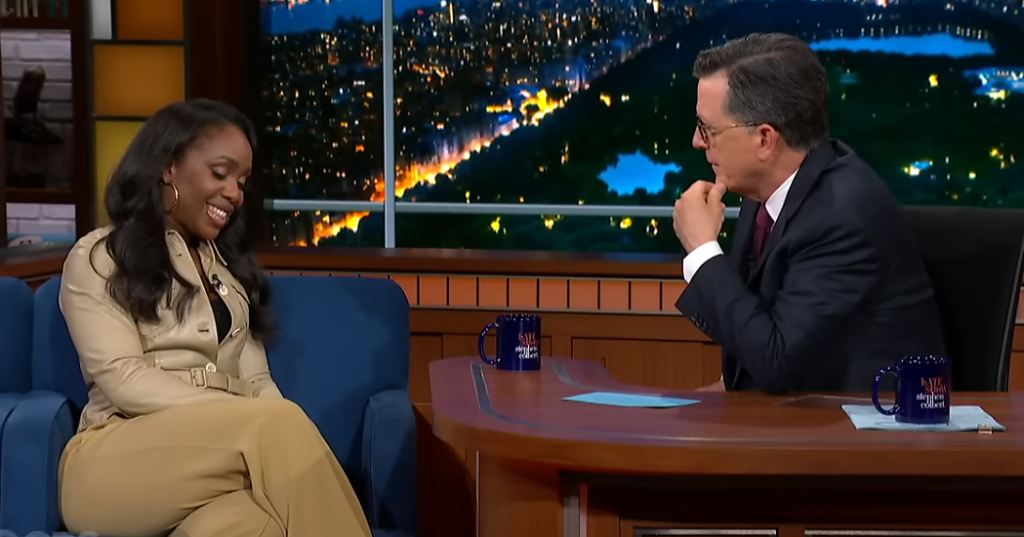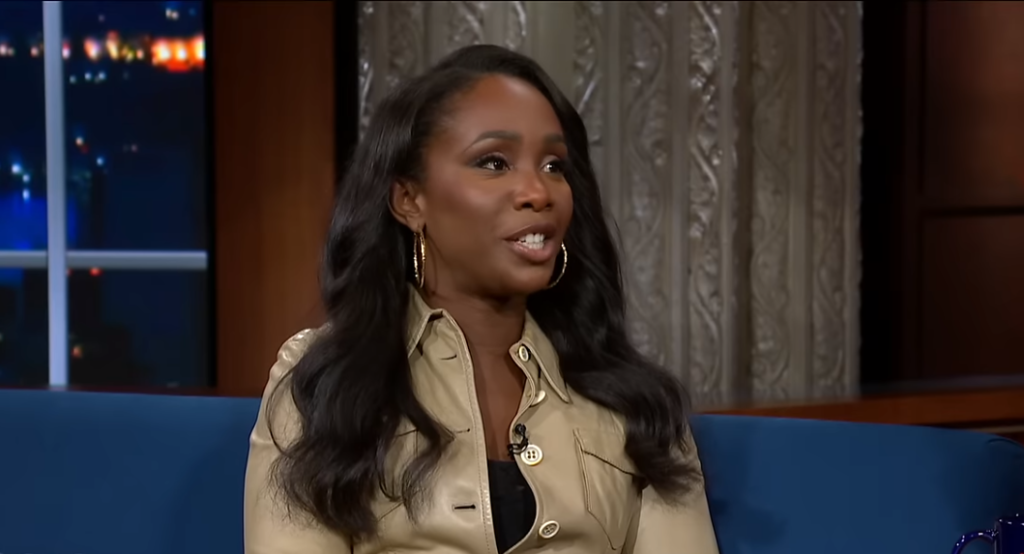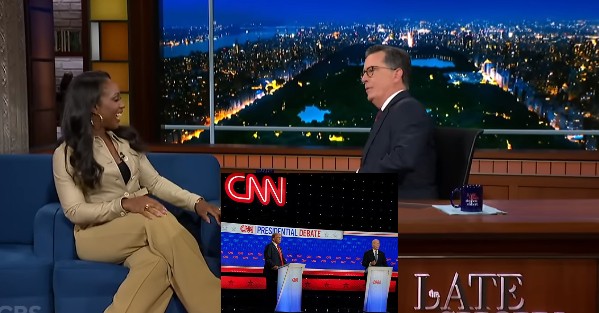CNN anchor Abby Phillip appeared on “The Late Show with Stephen Colbert” The CNN anchor Abby Phillip found herself in the hot seat as Colbert pressed her on the network’s handling of the presidential debate between Joe Biden and Donald Trump. The late-night host didn’t pull punches, questioning CNN’s decision not to fact-check Trump’s statements in real-time, despite anticipating a barrage of falsehoods. This interview comes amidst growing criticism of CNN’s debate coverage, with some arguing that pitting a candidate convicted as criminal against the sitting U.S. President reflects poorly on both the network and the office of the presidency.
Abby Phillip’s appearance on the show appears to be part of CNN’s damage control efforts to address these concerns and defend their debate strategy in the court of public opinion. Phillip, who has experience moderating Democratic primary debates, offered insights into the complexities of managing such high-stakes events.
Democratic Unrest: Concerns Persist Despite White House Efforts
The conversation then shifted to the aftermath of the debate and the White House’s attempts to quell growing concerns among Democrats. Abby Phillip revealed that President Biden’s subsequent 22-minute interview with George Stephanopoulos, intended to reinstate confidence, did little to assuage worries within the party.
Phillip shared insights from her sources, describing a “silent scream on the inside” among many Democrats. She recounted a call from a well-connected Democratic source who, even after the Stephanopoulos interview, expressed the sentiment that “This is so bad.” Phillip emphasized that the anxiety extends beyond Biden’s performance to the potential alternatives, stating, “People are still freaking out about both Biden staying on the ticket and what could happen if he doesn’t.”
Looking Ahead: Uncertainty and Speculation
As the discussion turned to the future, Abby Phillip likened the current political climate to a “slow-moving roller coaster,” with moments of rapid descent followed by slight upticks. She cautioned that the situation is far from resolved, noting, “We are not at the end of the roller coaster. We are not where you slide into home base.”

The conversation concluded with speculation about the upcoming Democratic convention in Chicago. Colbert raised the possibility of Biden stepping down and throwing his support behind Vice President Kamala Harris, suggesting such a move would dominate headlines for weeks. While Phillip didn’t directly comment on this scenario, the exchange highlighted the heightened anticipation and uncertainty surrounding the Democratic Party’s future.
As the political landscape continues to evolve, Phillip’s insights offer a glimpse into the complex dynamics at play within the Democratic Party and the media’s role in interpreting and reporting on these pivotal moments in American politics.
Abby Phillip on The Challenges of Real-Time Fact-Checking in Presidential Debates
According to Phillip, the mood on set quickly turned somber as the debate unfolded. “Probably within a couple of seconds, we were all just looking at each other in silence, kind of like ‘Are you seeing what I’m seeing?'” she recounted. Phillip candidly admitted that it was clear within moments that “this was going to be a rough night for the President,” with someone on set even uttering an ominous “Uh-oh” as they continued to watch.
Responding to accusations that moderators Jake Tapper and Dana Bash should have fact-checked candidates in real-time, Phillip emphasized the difficulty of the task. “First of all, it’s a hard, hard job. I don’t think people realize how difficult it is,” she stated. Phillip explained that the network’s decision not to fact-check during the debate was deliberate, distinguishing it from a one-on-one interview format where immediate corrections are more feasible.
Abby Phillip on Balancing Act: Facilitating Dialogue vs. Correcting Falsehoods
Abby Phillip elaborated on the rationale behind CNN’s approach, highlighting the need to maintain a balance between facilitating conversation and addressing inaccuracies. She argued that constant fact-checking could inadvertently give more speaking time to candidates prone to making false statements, particularly Donald Trump.

“The inadvertent effect of putting yourself in a position where you have to fact-check every single falsehood that is said on that stage — and there are a lot of falsehoods, some of them by Biden but way more of them by Trump — is that you inadvertently will give Trump actually quite a lot more time to talk,” Phillip explained. She emphasized that debates are designed for candidates to challenge and fact-check each other, rather than relying solely on moderators to correct misinformation.
The Value of Debates: Showcasing Candidates in Real-Time
When questioned by Colbert about the necessity of debates, particularly given Trump’s history of making false statements and his legal troubles, Abby Phillip staunchly defended their importance. She argued that debates serve a crucial role in informing the American public, especially those who may have “forgotten” what Trump was like during his presidency.
“There are a lot of people who have kind of forgotten what Trump is like, what he was like,” Abby Phillip stated. “There was COVID. A lot of this has kind of left the brain.” She emphasized the importance of allowing voters to see candidates as they currently are, not just as they remember them. Phillip also noted that the Biden campaign had requested the debate and agreed to its rules, intending to challenge Trump directly – a strategy that, in her assessment, was not successfully executed during the event.
As the conversation concluded, it became clear that while CNN’s approach to the debate may have been controversial, the network stands by its decision to prioritize candidate interaction over moderator intervention. This stance, as articulated by Phillip, reflects the ongoing debate within journalism about how best to cover political events in an era of heightened misinformation and polarization.














